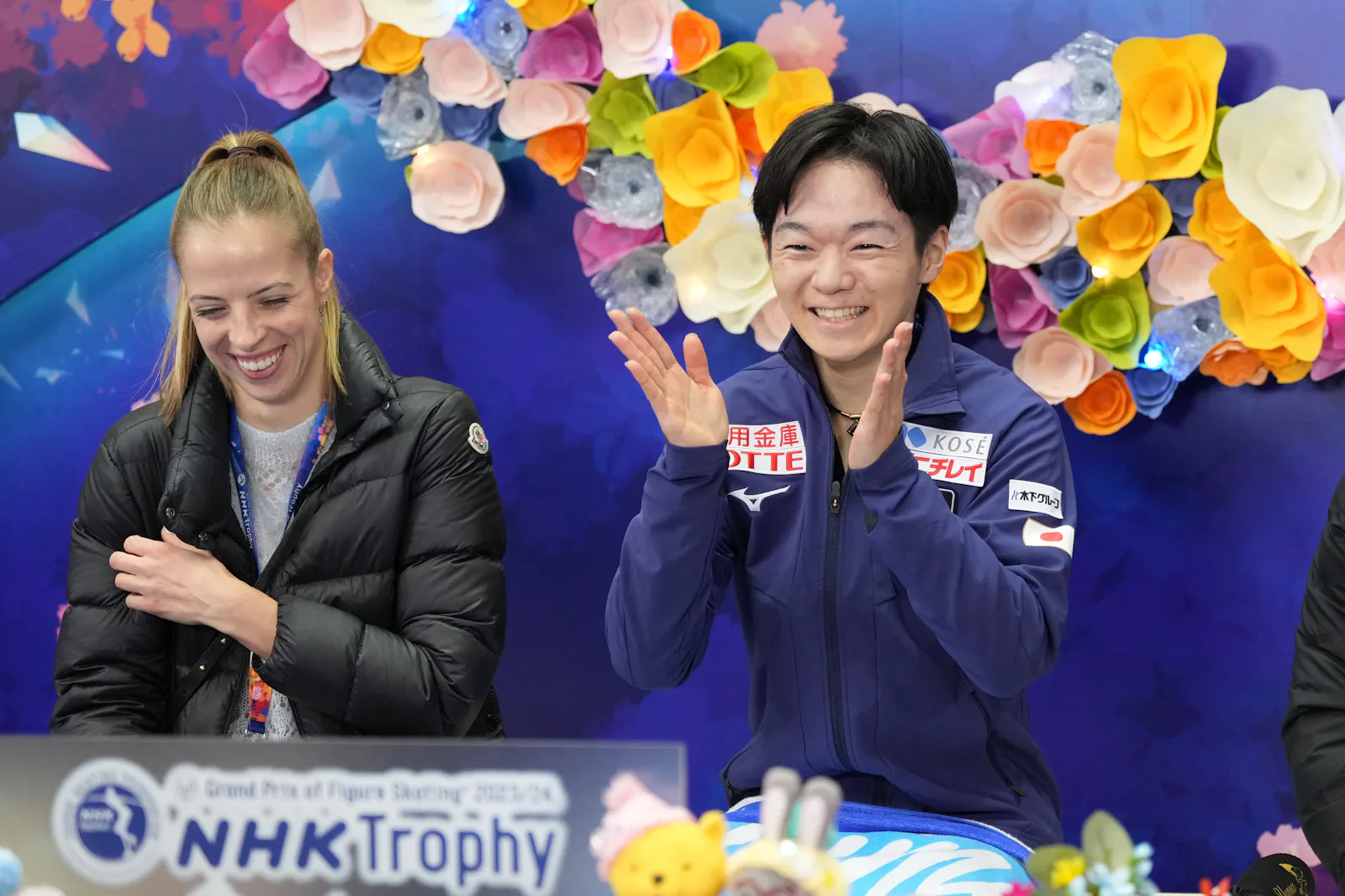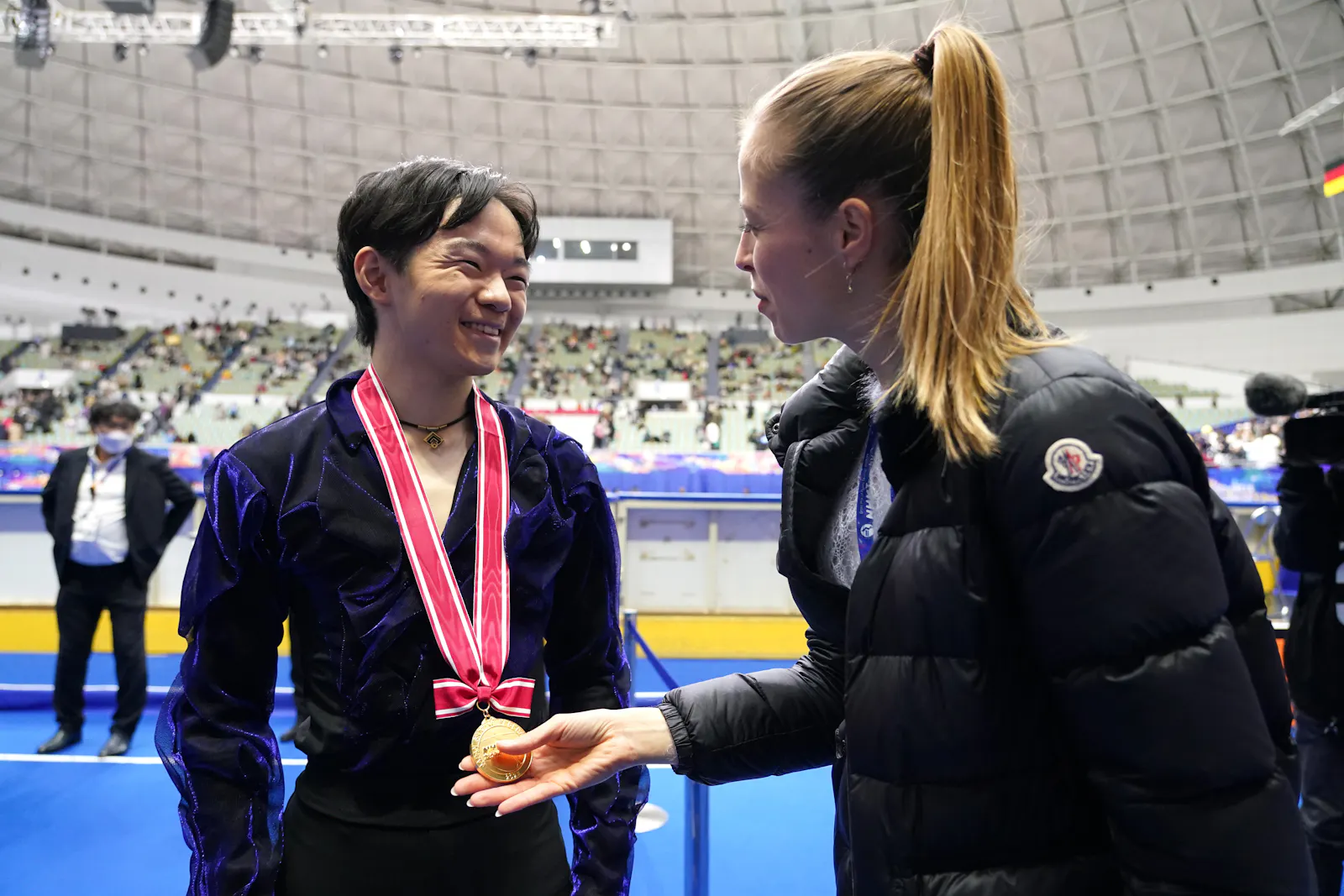Interview with Carolina Kostner
World and European figure skating champion Carolina Kostner has recently embarked on a collaborative journey with Olympic Silver medalist Yuma Kagiyama, following their work with renowned choreographer Lori Nichol. Over the past several months, Carolina has been accompanying Yuma to various competitions, offering her expertise and insights. Following the Grand Prix Final, our conversation took place in Beijing, where we delved into multiple aspects of Yuma's performance and Carolina's new role in his skating journey.

Photo © International Skating Union (ISU)
Solène: What did you think of Yuma’s performance at the Grand Prix Final?
Carolina: We were disappointed about the mistake on the Salchow in the free program, but we are very happy that he could stay focused despite knowing that he lost points on one of his most important technical elements. It's an excellent sign, and he should be very proud.
Solène : Yuma has grown a lot since the Lombardia Trophy in September. How do you reflect on these last few months?
Carolina: Yuma wants to try to grow from competition to competition. Returning after such a long time out of competition is always challenging. Also, he had a lot of pressure as he got outstanding results during the Olympic season. Building back confidence and getting back in shape wasn’t easy. Healing the injury properly took a lot of time and patience. His determination was very impressive. He wanted to show something new for his return to competition. You could see the fire in his eyes and his willingness to improve. He wanted to work on the details and understand the music and art within the music. We had a lot of fun working on that and intensifying the artistic aspect of his skating. Of course, it's not just me. We are a bigger team with Lori Nichol, Shae-Lynn Bourne, and his coach Kagiyama Sensei. It has been an incredible journey for us too.
Solène: Are you working with him on both the technical and the artistic sides?
Carolina: My involvement is mostly regarding all the skating and artistic aspects. I’m giving Yuma an extra set of eyes. I can help understand how the audience and the judges perceive the program and also how it can be felt from a skater's point of view. I’m also helping Yuma figure out how to have the choreography come to life and enjoy it. It's been a long-time dream of Lori Nichol and me working together. It's been inspiring for me to assist her during the choreography season and help the skaters understand her vision and be able to translate it into their own skating and style. It has been very intense with Yuma, and I think Lori's long experience adds much value to his skating and artistic growth.
Solène: You look very calm behind the board when working as the coach. How are you feeling about it?
Carolina: I do feel calm. I was expecting to feel very nervous, though. My experience competing for a long time at a high level and attending two Olympics helps. Now, I only need to stand there and support the skater. I don't have to do anything, so why would I be nervous? (laughs)
Solène: Did you stay in Japan between the NHK Trophy and the Finale?
Carolina: Yes, I did. Yuma and I live far apart. We try to use every opportunity we have to train together. Nowadays, we also have technology, and we can send each other videos and messages, but of course, being really together is always better for the energy, the motivation, and the inspiration. We enjoy training together, trying out new things and having fun. Especially in those weeks when competitions are back-to-back, and pressure is building up, keeping it light and fun as much as possible is very important.

Photo © International Skating Union (ISU)
Solène : You're also working with Rebecca Ghilardi and Filippo Ambrosini. What’s your role with them?
Carolina: I'm being an advisor and helping them in any way I can. We have different support systems in Italy called Sport Groups. We are from the same group, and I had the privilege of taking on a new role as a technical director.
Solène: Were you able to watch the women's competition in Beijing?
Carolina: Not as much as I wanted to, but I enjoyed Kaori’s speed, ease, and effortlessness throughout the program. I also enjoy Isabeau's personality starting to bloom. Seeing the juniors putting up a fight was a fascinating window into the future. I wish them all the best, especially to stay healthy to maintain consistency.
Solène: One of your most iconic programs was Bolero. Kevin Aymoz is doing his own Bolero this year. Have you watched it?
Carolina: I saw it mostly in practice, and I enjoyed it. Of course, each time I hear that music, it brings me back to a special place with special memories. It's great Kevin can bring his own style to it.
Solène: The next Olympics will be in Milano-Cortina. What will be your role there?
Carolina: I’m very excited about it and being an ambassador. We are already doing many projects, going into schools, and discussing the Olympics and its values. I’m telling the children about my life and career and how the sport helped me grow and develop my personality and self-confidence. Sport gave me a future and guided me to become who I am today. I hope to give them some spark, and who knows, maybe start a big dream and a big sports career.
Solène: The Italian team probably has big dreams for the Olympics, especially about the team event.
Carolina: Having the Olympics in your own country is a big motivation. Having the chance to build on this dream of representing our own country, being part of a strong team, and being part of history is a big drive for them. I wish them all good luck, and as I said before, stay healthy so that you can be the best skater you can become.
Solène: This interview was done in English, but I know you can speak French!
Carolina: I learned it in school, and it sounds very close to my mother language (NB : Ladin, a dialect of northeastern Italy). Besides, being friends with Stéphane (Lambiel) helped. He is a very good teacher!